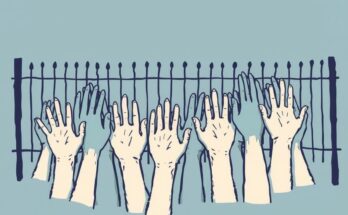Original Source: www.unaids.org
As the world approaches World AIDS Day on December 1, a compelling report from UNAIDS underscores the critical importance of upholding human rights to eradicate the AIDS pandemic by 2030. Titled “Take the rights path to end AIDS,” the report emphasizes that significant strides in HIV response are impeded by human rights violations, which obstruct access to essential services for marginalized groups. Winnie Byanyima, UNAIDS Executive Director, highlights that denying education, facing violence, or criminalization based on identity hamper the fight against AIDS.
Despite recent advancements, 9.3 million of the 39.9 million people living with HIV lack access to life-saving treatments, leading to 630,000 AIDS-related deaths last year alone. Among young women aged 15 to 24, 570 new infections arise daily, particularly in eastern and southern Africa, where they are three times more vulnerable than their male counterparts. Activist Nomonde Ngema urges the need for education to tackle discrimination and violence against girls as both a human rights and health emergency.
Criminalization further complicates access to HIV services, with 63 nations still outlawing same-sex relations, thus exacerbating the epidemic within those communities. The disparity in HIV prevalence, where rates soar five times higher in restrictive countries, indicates a dire need for legal reform. Axel Bautista from MPact Global Action emphasizes that punitive policies obstruct essential HIV prevention and treatment for marginalized populations.
Innovative medical advancements, such as long-acting injectable treatments, can significantly alter the trajectory of AIDS, but only if shared equitably without profit-driven limitations. Alexandra Calmy from University Hospitals of Geneva stresses that lifesaving medical tools should not be treated merely as commodities; accessibility is crucial for universal health.
Jeanne Gapiya-Niyonzima, a leading voice in Burundi’s HIV community, stresses the pathway to a thriving society is rooted in the protection of human rights. The UNAIDS report features essays from influential figures like Elton John and Michael D. Higgins, who argue that compassion and a commitment to human rights are vital to overcoming the stigma surrounding HIV and ensuring effective action against AIDS.
The collaborative efforts of UNAIDS unite various UN bodies and national entities to realize a vision of zero new infections and deaths due to AIDS, thereby weaving a hopeful narrative as the world fights towards the 2030 goals.
The UNAIDS report released ahead of World AIDS Day highlights the intersection between human rights and public health in the ongoing battle against the AIDS pandemic. It underscores the need for global leaders to protect the rights of all individuals, particularly marginalized groups, as a way to ensure access to vital HIV services. The statistics regarding new infections and lack of treatment underscore the existing gaps in the response to the AIDS epidemic, revealing systemic issues that require both legal and societal change. This context allows for a deeper understanding of how human rights violations act as barriers to achieving health equity and ending the AIDS threat.
To end the AIDS pandemic, it is essential to prioritize human rights and ensure equitable access to HIV services for all individuals, especially marginalized communities. The UNAIDS report calls for urgent actions to dismantle legal barriers and address discrimination, emphasizing that only a rights-based approach can lead to effective solutions. By fostering an inclusive environment and tackling stigma, the world can make significant strides toward eliminating AIDS as a public health threat, ultimately realizing global health goals by 2030.



